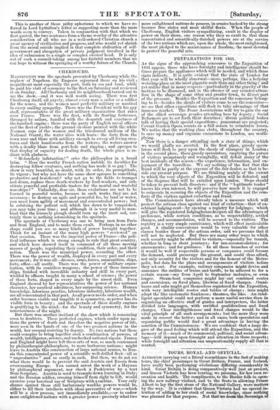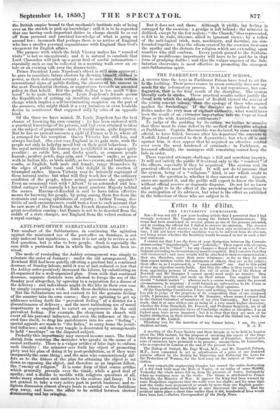TO1JR4S, ROYAL AND OFFICIAL. flee
Aernotren cerrying out a literal resemblanee in the fitet of Making tours, the chief personages in Great Britain Fratibe, and Ireland, have really been performing' eVoIntions differing eeoneielerably in kind. Great Britain is doing comparatively well just at present, and Queen Victoria has been touring, we presume, Air her own re- creatiOn and health. The compliments, to the Border folk in open- ing the new railWay viaduct, end' to the 'Soots in allowing Prince Albert to lay the first stone of - the National Gallery, were matters by the way. It is evident that-Queen Victoria had no special in- tention of adding to her stock Of social knowledge, since nothing was planned for that purpose. Not that we deem the Sovereign of
the British empire bound to that mechanic's institute rule of being ever an. the stretch to pick up knowledge : still it is to be regretted that one having such important duties in charge should be so cut off from personal and practical knowledge of what is going on around her; insomuch that perhaps there is no native of England who has a smaller personal acquaintance with England than God's vicegerent for English affairs. The purpose with which the Irish Viceroy makes his "round of visits" is not so unequivocal; and it is natural to conclude that Lord Clarendon will pick up a great deal of useful information— especially such as can be collected in a morning walk over an es- tate or an evening talk over the dinner-table.
Prince President Louis Napoleon's object is still more apparent : he goes to conciliate future electors by showing himself, clothed in power, as their deferential servant ; and to ascertain, from certain oonventional signs a. public feeling, the chances of his success in the next Presidential election, or suggestions towards an amended policy in that behalf. But the public feeling is too much ‘! doc- tored 7 to be quite trustworthy. Louis Napoleon's friends aeonse the Republicans of getting up insulting and suggestive cries ; a charge which implies a self-ineriminating suspicion on the part of the accusers, who might think it a very harmless or even laudable device to counteract that supposed sally by cries of an opposite kind.
Of the three we have named, M. Louis NapoleOn has the best chance of knowing his own country : he has been endowed with a practical knowledge of its pri.ons, and had even attained to ideas on the, subject of pauperism—now, it would seem, quite forgotten. But he has no present access to a sight Of France as it is, where all is arranged for his reception. Queen Victoria has still less, and always has had. She-ever sees England in its gala state, with the people not only in holyday mood but en their good behaviour. To the royal naturalist the human race is exhibited in an aspect quite peculiar as cattle low, and. ducks quack, so common people hurrah ; poultry perch, dogs grin, and " humans " smile ; as geese walk in Indian file, as birds nidify, as bees swarm, and build honey- combs, so English, both male and feinalC, range themselves by the edges of public roe& and take delight in the erection of triumphal arches. Queen Victoria may be intensely, cognizant of these natural traits; but *hat will they teach her of the ordinary condition of the people, whose acting governors she appoints ? . Even an occasional visit with" Albert!' to an astounded and bea- tified cottager will scarcely let her most ,,;raeious Majesty behind the scenes. Haroun-el-Rasellid is said to have taken effective means for knowing his people, by going amonn.° them free from the restraints and searing.splendours ef royalty ; Arthur Young, des- tittite of sueli encumbrances, Could turn a tour to such account that he saw pore of the French than, the French themselveS—even the great revolution coming': but France is not to be descried from the saddle of a state charger, nor England from the velvet cushion of a royal carriage.



























 Previous page
Previous page